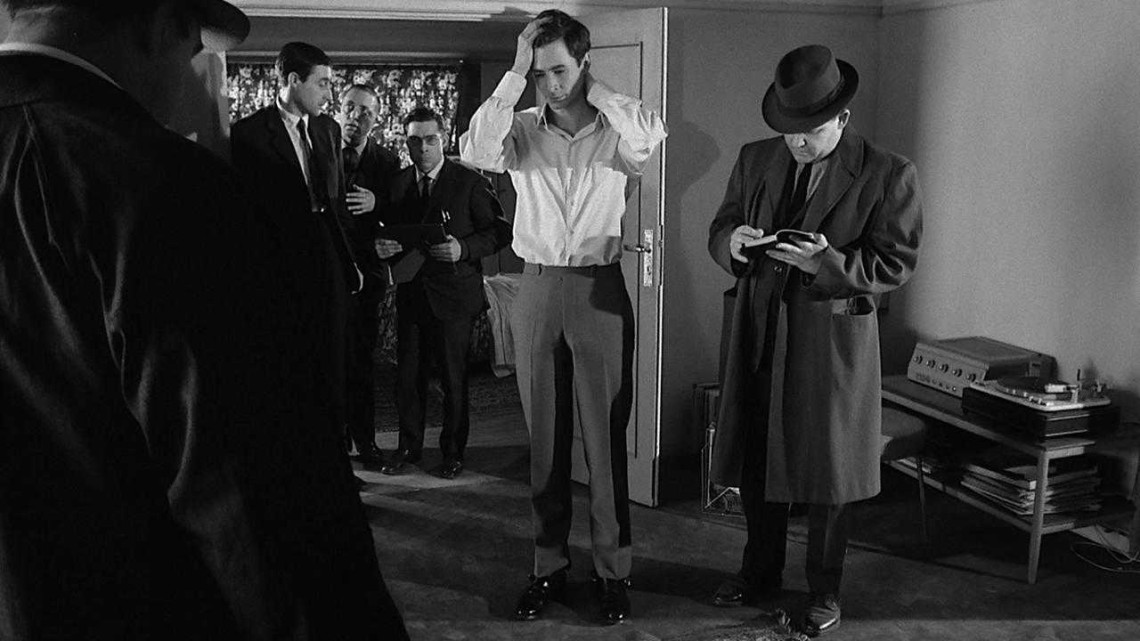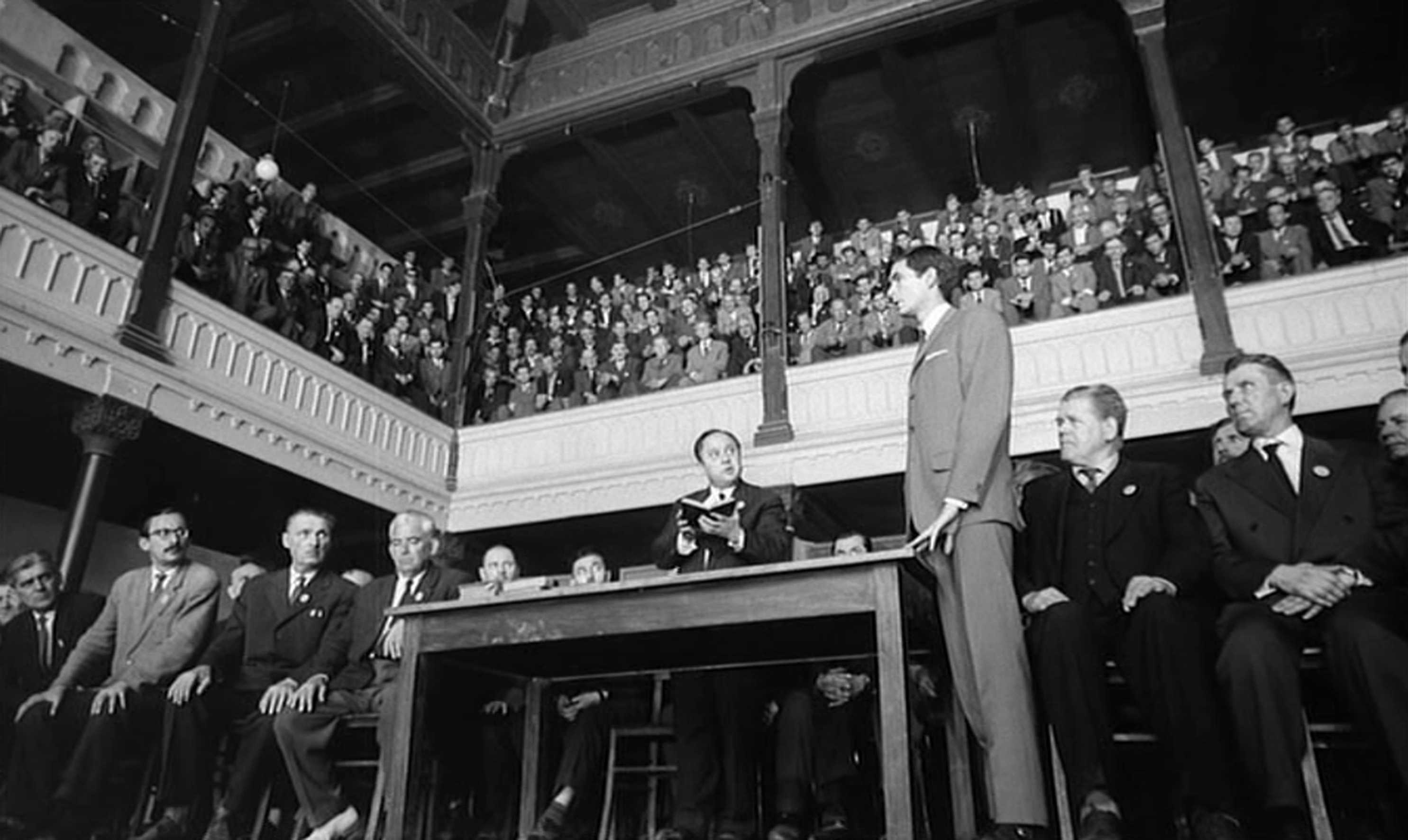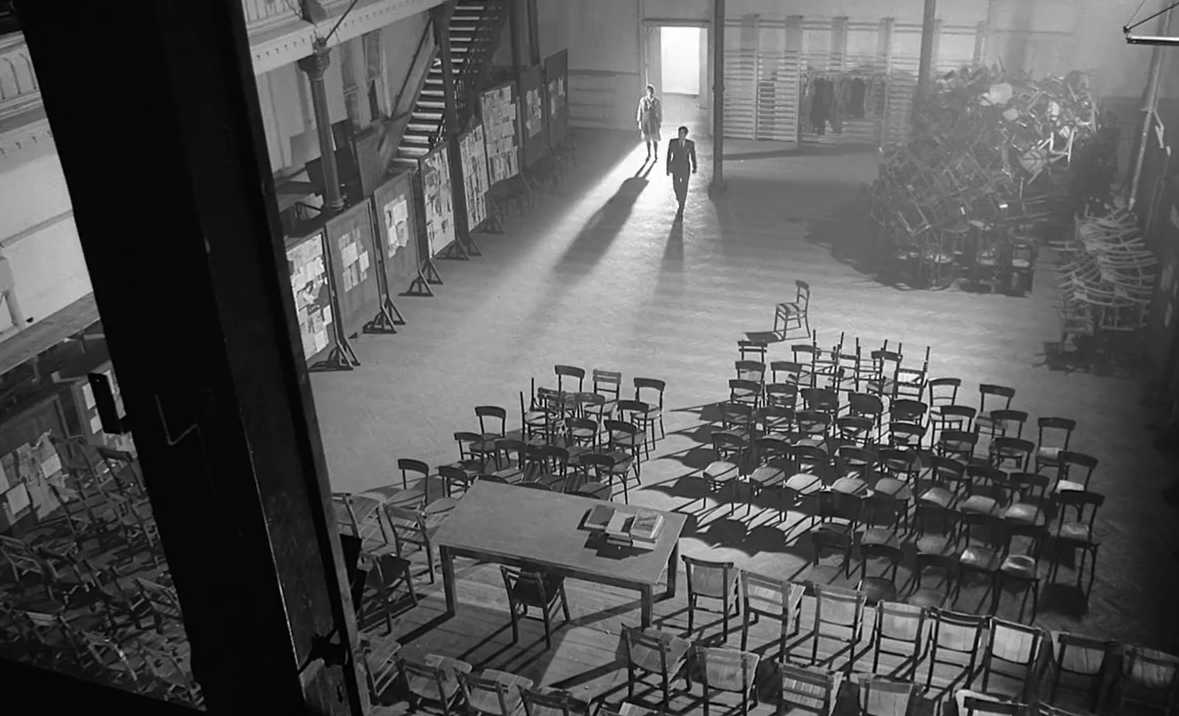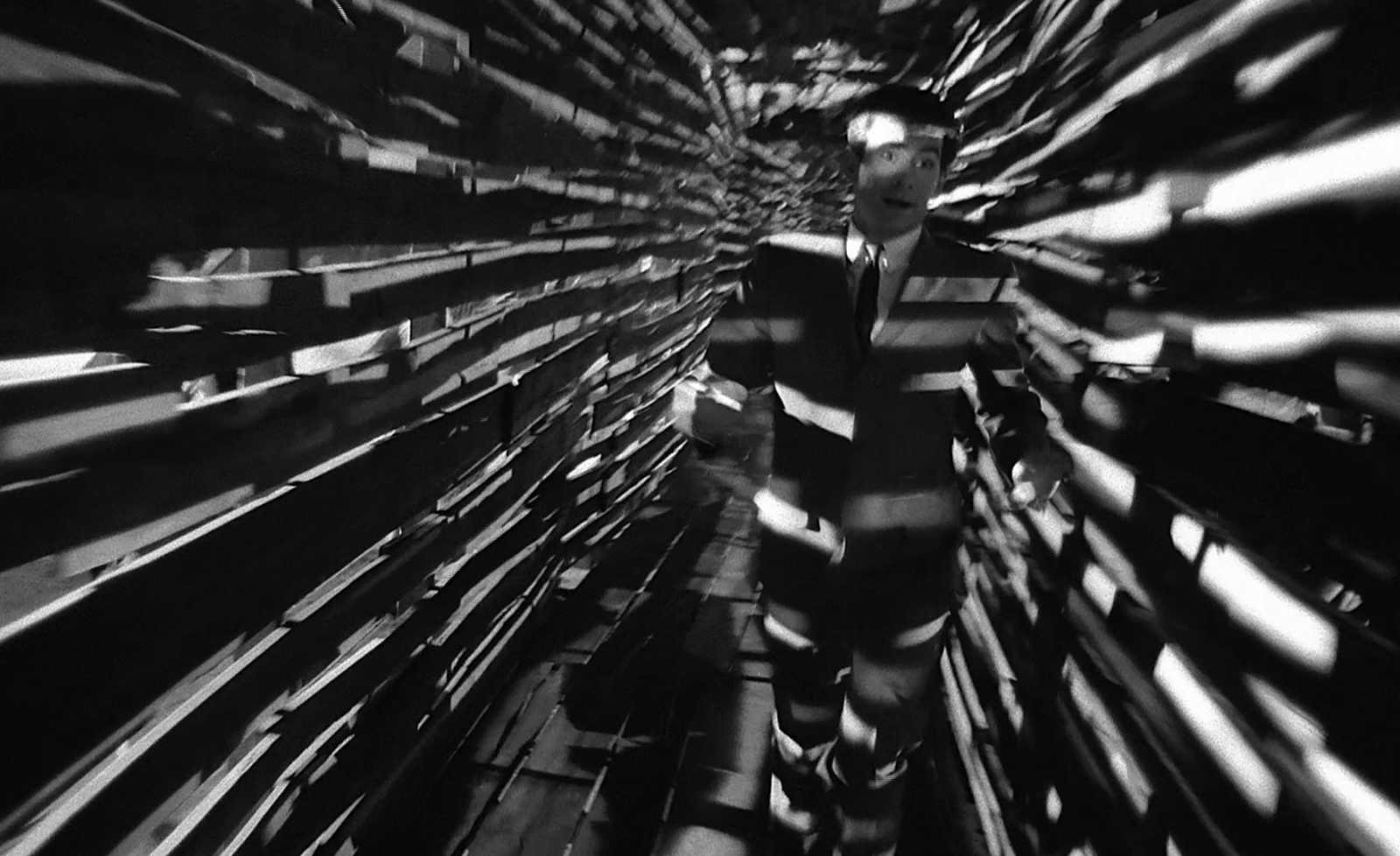“It has been said that the logic of this story is the logic of a dream, or a nightmare,” says Orson Welles in the opening narration of his 1962 adaptation of Franz Kafka’s The Trial. He seems to be talking specifically about a brief parable he’s just related from the novel—an allegorical tale about a man who spends his life futilely waiting at the gates of the law. But Welles could easily be speaking of The Trial itself, both book and film. He cuts from this observation to a close-up of his protagonist, Joseph K (Anthony Perkins), slowly waking up—as if to underline, in can’t-miss fashion, the dreamlike quality of the story that’s about to unfold.
This is a beautiful but ultimately unremarkable way to kick off a Kafka adaptation. Not only is this Kafka, it’s also Orson Welles, whose Citizen Kane combined the innovations of German Expressionism with the gloss of Hollywood’s dream factory. The man who took the dime-store pulp of Touch of Evil and turned it into a sweaty, waking nightmare of frenzied motion, canted angles, and hothouse hysterics. Of course it’s going to be a dream. Of course it’s going to be surreal.
But maybe that’s one reason why The Trial possesses such a unique place in the director’s filmography. Because, for all our anticipation of high Wellesian style, The Trial constantly upends our expectations. It’s a film of unsettling opposites. Its fevered bursts of style are offset by eerily long, subdued dialogue scenes. For all the grim portent of that opening, the film also works as a dark comedy. And even though it places us firmly within the mind of its protagonist—that Kafkaesque cypher K, at once Everyman and no man — the film also undercuts that conceit by suggesting that K might not always be the innocent he pretends to be. Indeed, Welles uses his dream narrative to bring us face to face with a very stark reality: That, in the modern age, we are often responsible for our fate, and for our own downfall. Kafka’s symbolic novel of bureaucracy, law, and guilt captured something universal about the human condition. Welles literally explodes that to create a parable of the twentieth century, one that both embraces and destroys the Cult of the Individual.
Unlike other classics the director struggled to put onscreen for many years—Conrad’s Heart of Darkness, Shakespeare’s The Merchant of Venice, and Cervantes’s Don Quixote among them—Kafka’s novel was not a long-time dream project for Welles. He decided to do it only after being given a list of 82 titles he could adapt by producer Alexander Salkind. “I know that [is] very disappointing,” Welles tells a University of Southern California (USC) audience in the unfinished documentary, Filming The Trial, “because you want to think of a filmmaker as having studied in his library the work which sings the most perfect song to him, and that I had spent my life wanting to realize Kafka on the screen. I’d never given a thought to it!”
Still, the prospect of turning an acclaimed classic into a big motion picture was probably irresistible to Welles, who in the early 1960s was still licking his wounds from a brief, abortive return to Hollywood that had resulted in Universal taking 1958’s Touch of Evil away from him in post-production. By contrast, Salkind assured Welles total control over The Trial—a promise to which the producer would remain faithful. Somewhat ironically, The Trial would prove to be the opposite of Touch of Evil in terms of reception. While Touch of Evil was treated like a studio knock-off upon release, its reputation as one of Welles’s greatest films has been rock-solid for decades. The Trial received a release worthy of a prestige production, but was perceived as a disappointment, or at most a valiant effort that didn’t quite rate. Few recognize it even today as the masterpiece it is.
Perhaps it’s because Kafka’s work wasn’t so canonical in Welles’s mind that he felt free to take liberties with it. He reordered the chapters, changed the ending, and updated it with references to modern technology and to the post-WWII period. Kafka, writing around 1914 (the book would be published after his death, in 1925), had proven quite prophetic about the encroaching, opaque complexity of the state. Welles takes that a few steps further and brings it into the modern age. He includes a scene with a (female) computer that reads personality tests. At one point, K comes across a group of old, weak men with numbered signs around their necks—a moment that can’t help but remind us of the Holocaust. The film’s finale, in a departure from the book, has K not being stabbed but blown up with a grenade, in an explosion that grows so large as to resemble a mushroom cloud—a reminder of the modern state’s ultimate power to destroy individuals en masse.
But Welles also honed in on the mordant humor of Kafka’s work, cutting through its Mittel-European torment to find the cosmic joke within. In Welles’s vision, a man lost inside a bureaucracy of words has as much comic potential as Jacques Tati lost inside a vast, traffic-snarled modern city. In The Trial, humor and terror live in unlikely, but essential harmony: The film is too absurd to be labeled a drama, but too terrifying to be labeled a comedy.
Consider the opening scene, in which an unnamed Inspector (Arnoldo Foa) steps into K’s bedroom and wakes him up—a mix of comedy and nightmarish unease, as K’s lanky frame and angular gestures contrast sharply with the eerie stillness of his interrogator. (Watch how the Inspector opens the curtains to let light in, but remains himself in the shadows.) Meanwhile, the rat-tat-tat dialogue pins K to the wall, forcing him into Freudian slips and telling misstatements that will later haunt him. (“What’s this machine?” “That’s my pornograph… phonograph.”) Throughout, Perkins plays the character perfectly, his exaggerated aw-shucks mannerisms blurring into doth-protest-too-much insistence. He seems to get particularly riled up when the Inspector suggests that K was waiting for the door of his bedroom to open—as that door connects to the bedroom of fellow tenant Ms. Burstner (Jeanne Moreau), a beautiful nightclub dancer. Later, we discover that K himself does in fact covet Ms. Burstner: Finding her drunk and alone in her room, he closes the door—against her mild protests—then slithers up beside her in bed and kisses her, in a scene that feels like it could either be a creepy seduction, or something out of a wet dream. Welles lets the uncertainty hang tantalizingly in the air. We don’t know whether to be aroused or squirm, so we do a little of both.
After informing K that he’s under arrest, the men tell him he’s free for now to go about his business. At work, K finds out his boss knows of his arrest. Later, at the opera, K is accosted by more cops, who tell him that they’ve agreed to interrogate him outside normal working hours. He is led through a maze of streets and hallways into an enormous, packed courtroom, where he eloquently stands up for himself as a representative of the common man—despite still not knowing what his crime is. Exiting the courtroom, he wanders amid a series of spaces, each different from the last—moving from modernist offices to dusty, Old World apartments, to vast, cavernous work areas filled with hundreds of people, to seemingly ancient, subterranean tunnels. Along the way, K comes across his Uncle Max (Max Haufler), who introduces him to the Advocate (played by Welles himself). The Advocate has agreed to take K’s case, even though he seems to spend all his time lying in bed being ministered to by his beautiful mistress/maid Leni (Romy Schneider), who herself then seduces K.
All these spaces and incidents are connected via dream logic. There is no way all these different rooms could all be part of the same building. Some doors are too small, while some are comically huge. Some ceilings are unnaturally low, while some are impossibly high. Lights hang ominously close above people’s heads. Character relations turn on a dime, then turn back again. Leni attempts to sleep with K, but later reveals that another man is staying in her tiny room, waiting for his chance to be heard by the Advocate. Is she also sleeping with him? The man seems curiously apologetic and shy.
Meanwhile, Welles’s highly mobile camera fixes itself on K and uses him to explore this unreal world. The film is mostly devoid of establishing shots; the camera often moves with K, and opens up spaces to us as he enters them. That has the added benefit of keeping us in a state of heightened unease, since we never quite know what we’re about to see. And the further K travels, the further he strays from what should be the workings of justice, lost amid the superficialities of the system, looking for people who can get him off. Among these is Titorelli (William Chappell), a painter whom K has been told has sway with the court. But, in the film’s strangest, most fevered scene, Titorelli seems more interested in taunting and toying with a huge gaggle of horny young girls surrounding his room than in discussing any aspect of the law.
If this description of the plot seems like it has a lot of sex in it, that’s because it does. An eerie sense of carnal unrest runs throughout The Trial, both the book and the film. Welles makes sure to connect Kafka’s dots. K’s boss seems to think our hero has something going on with his 15-year-old cousin Irmie (Naydra Shore). Could the man be right? When we first see Irmie, she’s staring at K through the sectional glass wall of his office. That scene is echoed later when Leni beckons K seductively by breaking through the glass of another sectional wall. And it’s echoed yet again later, as those frenzied girls surrounding Titorelli’s room peer and reach in through the slats of the wooden, fence-like wall. Sex is everywhere in this movie, visible to anyone who dares look closely: A thick law book hides a pornographic photo; the inspectors who initially hounded K are later discovered inside a broom closet, shirtless and being ecstatically flogged. K’s own sexual impulses seem to be mirrored all around him.
Indeed, as we watch The Trial, the more it becomes clear that K is very much a part of the system that’s consuming him—and that he is a more active protagonist than his passive reputation in literature may have led us to believe. He constantly reminds others that he’s rising in his position. His odd Freudian slips aren’t simple mistakes, but hint at repressed feelings: He, after all, is the one who comes on to Ms. Burstner, and he is the one who traipses off with Leni for a quickie, even as his uncle and the Advocate discuss his case. True, the unstated accusation against K plays off on the general sense of guilt we might all feel—that’s the genius of Kafka’s original work. But Welles takes it one step further, to suggest that in the twentieth century, we all bear a certain amount of responsibility for our predicament. K is a willing worker in this bureaucracy—his office, at one point, seems fluid and contiguous with the world in which he’s trapped. This is not a faceless, external society destroying the lone individual. This is the wheel destroying one of its own cogs.
“I find in the book repeated indications that K is a pusher on his way up the bureaucracy,” Welles told that aforementioned USC audience. “Not Mr. Zero on the adding machine. Not Little Mr. Nobody. Not the poor little faceless accountant. But a young man very anxious to get ahead in this world… And therefore in a state of real neurosis.” This observation may also lie at the heart of The Trial’s reception, for, not unlike Hitchcock did in Psycho, Welles uses Perkins as a wedge—we relate immediately to his boyish innocence, but are then disturbed by the darker corners of his soul. Except Psycho had good guys, too. In The Trial, K is the only game in town for audiences looking for a character with whom to identify. We are trapped in his perspective.
Indeed, K’s hinted complicity in his own persecution might be the most modern and resonant element of Welles’s The Trial—for it’s an idea that recalls both Stalin’s USSR, with its purges of party officials, but also the modern capitalist corporation. The rows upon rows of desks in K’s office remind me of Jack Lemmon’s workplace in Billy Wilder’s The Apartment. (Meanwhile, Roger Ebert, in his admiring review of the film, suggests that K’s predicament may allude to Welles’s own predicament in the byzantine world of Hollywood.) At once surreal, comic, terrifying, mythic, and modern, The Trial is a beautifully made film, but it is more than that. It is Orson Welles’s greatest, most acute testament on the times in which he lived.






















One thought on “Mezzanine Essentials: “The Trial””
Pingback: Parallax ViewThe View Beyond Parallax… more reads for the week of June 19 - Parallax View